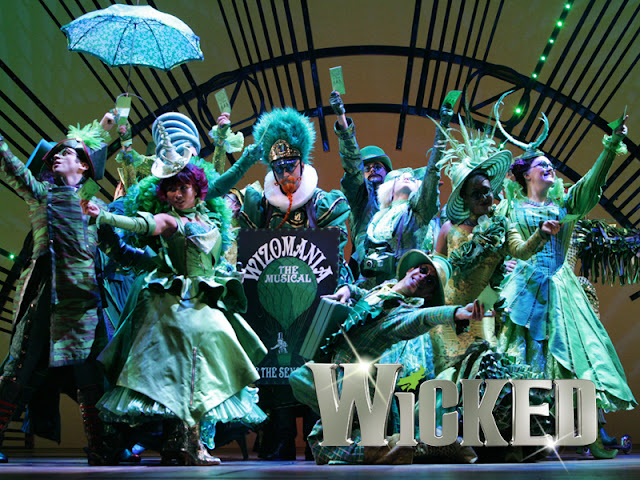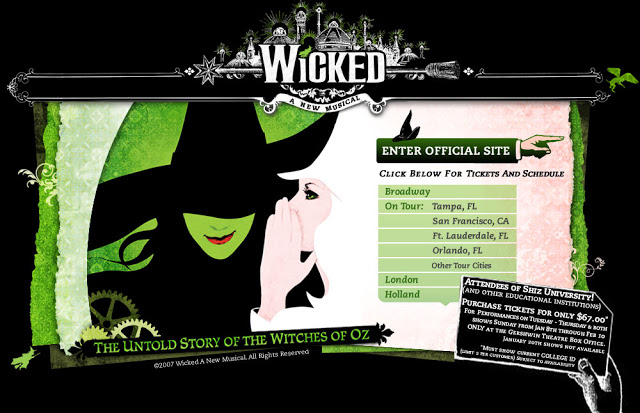After reading Lady T’s fabulous post on “I Am Woman, Hear Me Roar…ish,” aka songs that appear to empower women but really just signal faux feminism, I started thinking about actual feminist songs of female empowerment. Let me tell ya, there’s not a whole hell of a lot out there.
As much as I adore musicals, most songs are about men, either men singing them or women singing about men — men they desire or men who have done them wrong. Where are the songs belted out by the ladies for the ladies?? After perusing my DVD collection, Broadway ticket stubs and good ole’ google, I’ve compiled a list. In no particular order, here are my favorite powerful women anthems in musical film.
1. “Defying Gravity” — Wicked
Something has changed within me
Something is not the same
I’m through with playing by the rules
Of someone else’s game
Too late for second-guessing
Too late to go back to sleep
It’s time to trust my instincts
Close my eyes: and leap!
[…]
And nobody in all of Oz
No wizard that there is or was
Is ever gonna bring me down.
Okay, so right off the bat, I’m breaking my own rules. Wicked isn’t a movie…yet. But it has been performed at the Tonys, on Glee and the theatre version was written by Winne Holzman, a TV screenwriter. So there you go.
Based on the best-selling Gregory Maguire novel which tells the story of The Wizard of Oz from the perspective of the Wicked Witch of the West, it’s a stellar Broadway musical (read the novel and watch the play if you can; both different, both amazing). Wicked revolves around Elphaba, who becomes the Wicked Witch of the West — intelligent, studious, defiant, strong and outspoken, in short, one of my favorite female protagonists — and Glinda, the Good Witch of the North. It explores prejudice and the notion of good and evil (and who determines those labels). But at its core, the play is about embracing your unique individuality and the power of female friendship.
In “Defying Gravity,” Elphaba (sung by the stunningly talented Idina Menzel in the role she originated) sings about trusting her instincts, her desire to be free and realizing she possesses all the power she needs inside herself. She refuses to compromise her beliefs and won’t let society define her identity.
I love this story so much, as do countless others. So why haven’t we seen it on-screen?? Why are we getting stuck with the male-centric Oz: The Great and Powerful before Wicked?? It’s a travesty. But it is in pre-production. So hopefully, we’ll see a film version on-screen soon. Until then, I’ll keep pressing the replay button on this video…
2. “I’m Here” — The Color Purple
I believe I have inside of me
Everything that I need to live a bountiful life
With all the love alive in me
I’ll stand as tall as the tallest tree
[…]
But most of all
I’m thankful for
Loving who I really am.
I’m beautiful.
Yes, I’m beautiful,
And I’m here.
So, I tried to stick to musical film. But this song is just too damn good not to include on this list. I love the film version of The Color Purple. But I was blown away when I saw it on stage and heard the powerful lyrics. It’s a female-centric musical about Celie, an African American woman in the early 1900s South who faces sexism, abuse, racism and poverty. But through it all, she finds female friendship and a strength she never knew she had.
There aren’t enough musicals featuring women of color. And there aren’t nearly enough female empowerment songs. That’s what makes the song “I’m Here” so fantastic. Not only is it a beautiful, powerfully stirring song. But it’s sung by a black woman finally realizing her own inner power and self-worth. Celie is a strong survivor proudly declaring herself to the world.
At the end of this video, you can see Fantasia Barrino (who played Celie on Broadway) tearing up, emotionally spent from her wrenching performance, giving it everything she’s got and leaving it all on the floor. More of us need to emulate Celie and say, “Hey world, I’m here. Deal with it.”
3. “Don’t Rain On My Parade” — Funny Girl
Don’t tell me not to live, just sit and putter
Life’s candy and the sun’s a ball of butter
Don’t bring around a cloud to rain on my parade
Don’t tell me not to fly, I’ve simply got to
If someone takes a spill, it’s me and not you
Who told you you’re allowed to rain on my parade
I’ll march my band out, I’ll beat my drum…
“Hello, gorgeous.” Confession time! I’m kind of obsessed with Babs. Love, love, love her! So yes, she’s here on this list, not once but twice. Uh oh, spoiler alert!
In Funny Girl, Barbra Streisand’s first film, she plays comedian and stage and screen actor Fanny Brice, a role Streisand originated on Broadway. Fast-talking Fanny is convinced she’s going to be a huge star. In her signature song “Don’t Rain On My Parade,” she belts out how she’s not going to let anyone bring down her happiness. Now technically, Fanny is singing about a man. She quits the Ziegfeld Follies to follow her love Nick Arnstein. Yet I still always saw this song as one of female empowerment. Fanny’s going to live her life how she sees fit and she’ll be damned if she’s going to let anyone tell her what to do.
In the end of the play, the tone of which drastically differs from the film, she sings a reprise of “Don’t Rain On My Parade” about picking up the pieces of her life and not only surviving but thriving, holding her head high.
4. “La Vie Boheme” — Rent
To being an ‘us’ for once
Instead of a ‘them’
La vie boheme
La vie boheme
Okay, so this isn’t quite a female empowerment song. It’s sung by dudes too. So call it a gender empowerment song instead. Funny, bittersweet and tragic, Rent embraces diversity and the merit of creating your own family and community. A defense of “bohemian” living in the Lower East Side in the 80s, the song sung by the cast of Rent — characters who are straight, lesbian, bisexual, transgender, Latina, and African American — references female artists like Maya Angelou, Gertrude Stein and Susan Sontag. “La Vie Boheme,” and the entire play, openly talk about choice, poverty, HIV/AIDS, homosexuality and bisexuality. And of course I love any song that mentions vegetarian food. No joke.
5. “Sister Suffragette” — Mary Poppins
We’re clearly soldiers in petticoats,
Dauntless crusaders for women’s votes!
Though we adore men individually,
We agree that as a group they’re rather stupid.
Cast off the shackles of yesterday!
Shoulder to shoulder into the fray!
Our daughters’ daughters will adore us
And they’ll sing in grateful chorus,
“Well done, Sister Suffragette!”
I’ve already written about
my unabashed love for Mary Poppins and its accidental feminism. I absolutely adore watching and listening to Glynis Johns as Mrs. Winifred Banks, a mother fighting for women’s right to vote, belting out “Sister Suffragette.” How many other musicals contain overtly feminist songs advocating gender equality and sisterly solidarity? In this age of attacks on women’s rights and reproductive justice, I’m clearly a sucker for a song calling, “Womankind arise!”
6. “A Piece of Sky” — Yentl
What’s wrong with wanting more?
If you can fly – then soar!
With all there is
Why settle for just
A piece of sky
One of my absolute favorite films, Yentl is an unusual musical in that all the singing is done by one person, the incomparable powerhouse Babs. (I told you there was another Babs song on the list!) It’s also one of the most feminist films I’ve ever watched.
Barbra Streisand directed, produced, wrote the screenplay and stars as an intelligent and inquisitive woman living in early 19th century Poland disguising herself as a man in order to study Talmudic Law, which women were forbidden from doing at the time. The film showcases female friendship and a female protagonist whose life — even though she idolizes her father and falls in love with a man — surprisingly doesn’t revolve around a man. It questions traditional gender roles, sexuality, patriarchy and ultimately advocates for gender equity.
The song “A Piece of Sky” sums up Yentl’s views, that she wants — no demands — more out of life. That she’s not going to settle for anything less than what she yearns for and she’s going to boldly follow her dreams. Despite the obstacles and constraints of societal conventions, Yentl remains rebellious, assertive and defiant throughout, choosing her own path.
If that’s not female empowerment, I don’t know what is.



